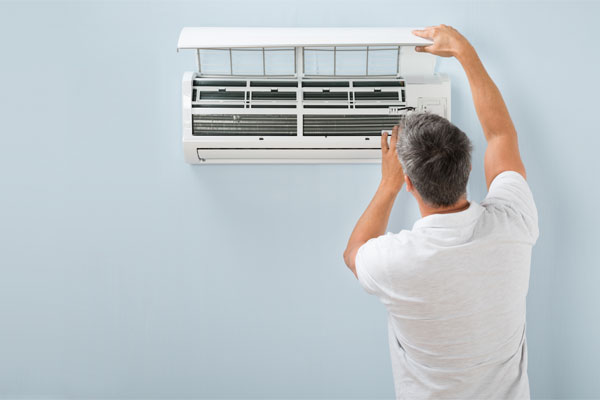There’s nothing worse than walking into your home and being smacked in the face with a funky, foul odor. You do a quick sniff test to ensure it’s not coming from the trash or any “forgotten” leftovers. But as you get closer to the air vents, that musty smell only intensifies. Uh oh…something’s not right with your air conditioner!
While AC systems are designed to continually cycle fresh, clean air throughout your living spaces, a number of issues can actually cause them to develop some less-than-fresh scent signatures over time. From mildew moisture buildup to actual critters taking up residence, there’s a variety of potential culprits behind that rotten smell.
The first step to addressing any bothersome AC odors is pinpointing the precise source. Certain smells provide valuable clues about whether you’re dealing with a simple ventilation cleaning need or a more complex mechanical problem brewing inside the equipment itself. Being able to properly diagnose that funk factor gets you halfway to breathing easier again!
From reviewing some of the most common sources of bad AC smells to going over DIY remedies and knowing when to call in professional help, this guide covers everything homeowners need to get their air quality back into the fresh restart zone. No more holding your breath when the blower kicks on!

Common Causes of Bad Smells from an Air Conditioner
Air conditioners develop some pretty funky aromas when things go awry inside those systems. From musty mildew smells to burning electrical stenches and worse – those odors usually signal an underlying issue brewing. Let’s dive into the most common culprits behind stinky AC units.
Musty or Moldy Smell
If your AC is kicking out an unmistakable musty, mildew-like funk, you’re likely dealing with excess moisture buildup somewhere in the system. As condensation accumulates in areas like drip pans or ductwork, it creates prime real estate for mold and bacteria growth. Beyond just being unpleasant, those microbes produce allergens and compounds that can aggravate respiratory issues.
Burning or Electrical Smell
Any sort of persistent burning, smoky odor should be cause for concern – it typically signifies an electrical issue or component overheating situation. From wire insulation damage and circuit board meltdowns to debris catching fire on heating elements, don’t ignore acrid smells that could signal potential fire hazards.
Rotten Egg or Sulfur Smell
Does your AC emit the foul, dense aroma of rotten eggs occasionally? If so, you may have a gas leak somewhere in your home that the air handler is circulating. Those sulfur-based smells indicate potentially dangerous natural gas or sewer gas exposure requiring immediate attention.
Sewage or Sulfuric Smell
Similarly, any strong sewage-like odors wafting from your vents usually mean the AC system is sucking surrounding air from drain lines or piping connected to waste plumbing. Aside from the stomach-churning smell, microbes and contaminants could be spreading through your home.
Dirty Socks or Stale Smell
While not as concerning from a safety standpoint, if your air conditioner is giving off a funky, stale “gym locker” type stench, it likely stems from excessive buildup of dust, dander, hair, and other debris coating the equipment’s interior surfaces. Essentially you’re just smelling your HVAC’s dirty laundry airing out.
Chemical Smell
A harsh chemical or paint thinner smell accompanied by eye or throat irritation suggests caustic chemical vapors have leaked into your air handling system, perhaps from storage areas or recent renovations. Get those odors checked as you could be breathing in hazardous fumes.
As you can tell, a foul-smelling AC can indicate anything from unsavory uncleanliness to dangerous electrical or gas-related situations requiring immediate professional help. Getting a professional nose on that funk is always wise!
How to Identify the Source of the Smell
That funky stench wafting from your air vents isn’t just unpleasant – it’s a cry for help from your AC system. But before you can remedy those foul odors, you need to get to the root cause. Where exactly is that smell originating from?
Initial Walk-Around
As soon as you get a whiff of something foul, do a quick walk-around inspection of the indoor AC unit itself. Give it a smell test up close. If that funk intensifies near the air handler, you’re likely zeroing in on the source area.
Air Filter & Coil Check
Don’t ignore the obvious – pull out the air filters and inspect them closely for excessive buildup of dust, hair, dander, and other gunk. A dirty filter can definitely create that “old socks” type odor. While you’re in there, check the evaporator coils themselves for any moisture or mold issues.
Ductwork Investigation
If the filter area seems clean, dig a little deeper into the ductwork itself which could be harboring odor hazards. Carefully remove some accessible duct segments and shine a flashlight inside looking for any moisture buildup, pest remnants, or airflow blockages causing problems.
Leak Inspection
Serious odor situations like rotten eggs, sewage, or chemical smells point to a leak or vapor crossover somewhere. Do a thorough examination of all ductwork connections, drainage lines, and the area surrounding the air handler for any cracks, separations, or breach points letting outside fumes infiltrate.
By starting at the airflow intake and systematically working your way through each component of the AC system, you can typically isolate the precise point where offensive odors are getting introduced. Just use caution with any gas-related funk to avoid spark hazards!
Solutions and Preventative Measures
Once you’ve sniffed out the source of those funky odors, it’s time to take action and get rid of whatever is stinking up your AC system. Depending on what’s causing that foul smell, you may need to roll up your sleeves and try any of these fixes:
Cleaning and Maintenance
For smells like must, mildew, or just overall staleness, a good deep cleaning of the AC is usually the solution. Get in there and scrub down things like the air filters, coils, blower housings, and any accessible ductwork runs. Sometimes all it takes is removing that built-up gunk and grime to freshen up the airflow again.
Dealing with Mold and Bacteria
If moisture is the problem leading to mold, mildew, or bacteria growth, you’ve got a bit more work ahead. Along with disinfecting any affected areas, you’ll need to thoroughly dry out any damp spots, repair any leaks or condensation issues, and maybe even replace porous materials that got contaminated.
Sealing Up Leaks
Nasty sewer gas or rotten egg smells point to likely leaks somewhere in drain lines, pipes, or venting that’s letting those fumes get sucked into your AC system. For hazards like that, you’re gonna want to call in a professional plumber to locate and properly seal off any vapor crossover points.
Electrical Repairs
If you’re getting a whiff of something hot and burnt like melting wires or electronics, shut the system off and don’t try any DIY electrical work yourself. Failed components like circuit boards or motors require an HVAC tech’s expertise to diagnose and repair the problems safely.
System Replacements
For really old, rundown AC units that just can’t seem to shake odor issues no matter what you try, sometimes the only permanent fix is just replacing the entire system with new, sealed ductwork and moisture-controlled equipment. Modern units are designed to prevent air quality problems right off the bat.
At the end of the day, you’ve got to accurately identify the cause behind those funky smells in order to choose the right odor-eliminating solution. Whether a little elbow grease and disinfectants do the trick or professional repairs are needed, getting rid of lingering stinks improves your home’s air quality tremendously!
When to Call a Professional
Let’s be honest – as handy as some homeowners might be, certain AC odor situations pose hazards or complexities better left to highly trained HVAC professionals with the proper equipment and know-how. While basic cleaning and filter replacements can solve minor funks, there are a few red flags where it’s wise to call in the pros before incidents escalate:
Gas or Chemical Odors
If you’re picking up on distinct gaseous odors like rotten eggs, sewage smells, or chemical fumes from the air vents, shut off your entire HVAC system immediately. Those stenches indicate potentially dangerous natural gas, carbon monoxide, refrigerant, or pesticide leaks that require specialized testing and repairs to resolve safely. Don’t inhale those toxic vapors any longer than absolutely necessary!
Persistent Mold/Mildew Issues
Excessive moisture problems leading to widespread mold and mildew growth throughout ductwork or HVAC components often necessitate professional-grade remediation efforts. Homeowners may struggle to sufficiently eliminate those allergy triggers and potential health hazards lurking in complex systems.
Foul Critter Situations
Unfortunately, rodents, birds, and other pests view our climate-controlled homes as prime real estate too. When decomposing critter carcasses or feces become the air quality culprits, extraction and decontamination tend to be delicate processes better handled by experts in protective gear.
Electrical or Mechanical Issues
Of course, the moment you smell anything burning like melted wires, circuit boards, or motor components, it’s an immediate sign that electrical or mechanical failures require the skilled diagnosis and repair capabilities of certified HVAC technicians. Prolonged operation could create fire risks.
Repeated Incidents
Have you already exhausted multiple DIY cleaning and maintenance attempts yet that funky smell keeps returning? Rather than continuing to chase your tail replacing filters or disinfecting coils, chronic odor issues suggest an underlying problem in need of experienced professional troubleshooting.
Aging Equipment Upgrades
For severely outdated or poorly functioning AC systems that seem to constantly struggle with ambient air quality no matter what you try, the wisest solution may be just biting the bullet for a full system replacement. Upgraded components and modern designs cure recurring headaches.
Your health, safety, and peace of mind shouldn’t be gambled over lingering HVAC odors you can’t pinpoint or properly resolve alone. Calling in professional assistance not only restores fresher indoor air quality but pinpoints developing issues before bigger problems and expenses arise down the road.
Breathe Easy Again with Snyder’s Fresh Air Professionals
There’s no dancing around it – living in Florida’s hot and humid climate means the last thing you want is your home’s air conditioner producing foul, funky odors instead of crisp, clean relief. From musty mold and mildew stenches to electrical burnouts and toxic fumes, stinky air quality is more than just an annoyance – it’s a potential health hazard.
While some sources of AC-based smells can get resolved through basic cleaning and filter replacements, many odor offenders prove too complex or hazardous for the average homeowner to troubleshoot alone. That’s where the trained professionals at Snyder come to the rescue!
Our certified HVAC technicians leverage their extensive experience combined with specialized equipment to accurately diagnose and eliminate any funky odors polluting your home’s air supply. We rapidly get to the root cause, whether it’s leaks, infestations, mechanical breakdowns, or another issue entirely. From there, Snyder’s fresh air solutions restore peak indoor environmental quality through comprehensive cleaning, repairs, or full system replacements as needed.
Don’t just mask those foul stenches – get them eliminated for good! Call Snyder Air Conditioning, Plumbing & Electric and breathe easy with Florida’s indoor air quality experts.


